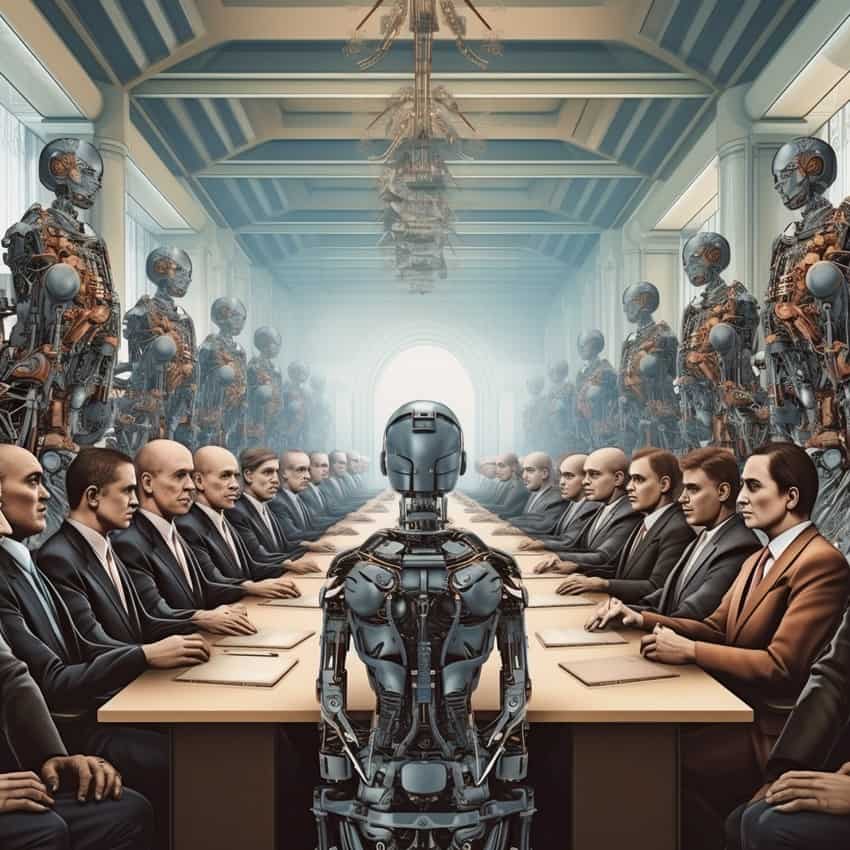The hunt for talent has just been upgraded. Welcome to Hiring 2.0 – the era where artificial intelligence (AI) changes how we acquire talent.
AI: The Game Changer in Talent Acquisition
Artificial Intelligence, once a concept relegated to the realm of science fiction, has become a pivotal player in today’s business landscape. One key area witnessing AI’s transformative impact is talent acquisition.
According to a 2023 LinkedIn report, 76% of recruiters believe that AI is instrumental in sourcing and attracting high-quality candidates. Why such enthusiasm for AI in this field? Well, the reasons are as numerous as the applicants in a Google job posting.
First, AI offers unmatched speed and efficiency. The traditional hiring process, often seen as time-consuming and cumbersome, is being revolutionized. Instead of HR professionals manually sifting through stacks of resumes, AI algorithms can analyze hundreds, even thousands, of applications in seconds. They’re tireless, working 24/7, giving companies that use them a significant competitive edge.
AI also brings a level of sophistication to candidate screening. Advanced AI systems move beyond keyword matching. They analyze data patterns and performance predictors, considering factors like job history, skills, and even subtle linguistic cues. As a result, businesses can identify top talent with greater accuracy.
Take the example of IBM. Using its AI-powered recruitment system, IBM reported a 30% decrease in time-to-hire, drastically cutting costs and boosting efficiency.
Indeed, the dawn of AI in talent acquisition is more than a trend; it’s a game-changer. As AI technology continues to evolve and improve, its impact on recruiting practices will only deepen. We’re not just hiring anymore; we’re in the era of Hiring 2.0.
Say Goodbye to Manual Screening, Hello AI
Imagine the herculean task of screening a thousand resumes for a single job opening. In the pre-AI era, this scenario would involve countless hours of human labor. Now, thanks to AI, we can say a cheerful goodbye to this tedious task.
AI tools are transforming the screening process at an unprecedented scale. They can evaluate hundreds, even thousands, of applications within seconds, reducing the time HR personnel spend on initial screening by nearly 75%.
But these AI tools aren’t merely speed readers; they’re also quite discerning. By leveraging advanced machine learning algorithms, they move beyond keyword searches. They analyze the richness of the content, looking at factors like skills, experiences, and job history. They can even factor in the job description’s nuances, such as cultural fit and soft skills.
One shining example of this is the AI screening tool developed by Pymetrics. Using neuroscience games and bias-free AI, Pymetrics matches candidates to jobs where they are most likely to succeed. The company reported that their tool reduced time-to-interview by 20%, significantly expediting the hiring process.
The upshot? AI tools are revolutionizing the way businesses screen candidates, enhancing efficiency and efficacy. This AI revolution in screening marks a paradigm shift from labor-intensive processes to streamlined, data-driven talent acquisition.

Fair Hiring: Can AI Overcome Human Bias?
The issue of bias in hiring has been a long-standing obstacle in talent acquisition. The promise of AI, with its data-driven approach, sparks hope in overcoming this challenge.
In theory, AI systems are unbiased, free from human prejudices that may cloud judgment. They’re able to analyze a candidate’s qualifications objectively, focusing solely on data, including job history, skills, and qualifications. For example, a study by the National Bureau of Economic Research found that AI-powered hiring software significantly increased the proportion of minority candidates selected for interviews.
But here’s the rub: AI tools are trained on human-generated data. If this data carries any historical or societal bias, there’s a risk that the AI system will inadvertently perpetuate these biases. The infamous case of Amazon’s recruiting algorithm, which downgraded resumes containing the word “women’s,” is a stark reminder of this pitfall.
While the potential of AI in promoting fair hiring is immense, careful design and regular auditing are critical. By recognizing and addressing the risk of bias, AI has the potential to pave the way for more equitable hiring practices.
AI Case Study: TalentSoft’s Success Story
TalentSoft, a leading HR tech company, offers a compelling case study of AI’s transformative power in talent acquisition.
Previously, TalentSoft’s hiring process was not unlike many others. HR teams had to manually comb through numerous resumes, a process that was both time-consuming and prone to human error. However, the introduction of AI changed the game.
In 2022, TalentSoft adopted an AI-powered recruitment platform to streamline their hiring process. This AI tool was tasked with sorting through resumes, identifying the most suitable candidates based on their skills, experiences, and the company’s needs.
The results were striking. TalentSoft reported a 35% reduction in their time-to-hire. The AI system was not just faster but also more precise in selecting candidates, leading to a significant improvement in the quality of hires.
Moreover, TalentSoft saw a 40% increase in the retention rate of new hires, showing that the AI tool was effective in matching candidates with the right roles.
TalentSoft’s journey underscores the potential of AI to revolutionize talent acquisition. It illustrates that with the right application, AI can facilitate a more efficient, accurate, and satisfying hiring process.
Is AI the End of the Human Touch in Hiring?
The rise of AI in talent acquisition has sparked a burning question: will the human touch in hiring become obsolete?
To answer succinctly: no. While AI is incredibly efficient at sifting through data and identifying patterns, it can’t replace the human element. AI can screen resumes in seconds and suggest the best candidates, but it doesn’t eliminate the need for human discernment and decision-making.
Take the interview process, for instance. AI can facilitate scheduling and even initial virtual interviews, but it can’t assess soft skills like emotional intelligence or a candidate’s cultural fit. For this, you still need the intuitive understanding and empathy of a human recruiter.
In a 2022 Deloitte survey, 70% of respondents agreed that while AI will become an integral part of HR, it won’t replace the human connection. Rather, it will augment it, taking over mundane tasks and allowing HR professionals to focus on more strategic, people-centered aspects.
The future of hiring, then, isn’t AI vs. human, but AI with human. AI is your digital assistant, your tool, not your replacement. It’s a blend of technology and human insight that constitutes the future of hiring.

Future of AI in Talent Acquisition
The world of talent acquisition stands at an exciting juncture. With AI’s ongoing advancements, the landscape of hiring will continue to evolve in ways we can only begin to imagine.
The future will likely see AI systems becoming even more sophisticated, learning from their mistakes and adapting to the ever-changing job market. Expect AI tools that not only screen resumes but also dynamically adjust job descriptions to attract the best talent, or even predict hiring needs based on market trends.
Looking ahead, AI might also play a more significant role in nurturing candidate relationships. AI-driven chatbots could keep candidates engaged throughout the hiring process, providing real-time updates and feedback, thus enhancing candidate experience.
Yet, as AI grows more integral to talent acquisition, ethical considerations will come to the forefront. Issues of transparency, data privacy, and bias will require rigorous attention to ensure AI’s responsible use in hiring.
This is just a brief overview due to the platform’s constraints. A more detailed article would explore each of these sections more in-depth, highlighting specific tools, strategies, and case studies that demonstrate AI’s impact on the talent acquisition industry. We would also delve into the potential ethical considerations and possible solutions to mitigate bias in AI-driven hiring.
In conclusion, the future of talent acquisition is decidedly AI-infused. As we stride into this future, the challenge lies in leveraging AI’s power responsibly, enhancing efficiency while preserving the human touch that makes hiring fundamentally a people-centric process.




